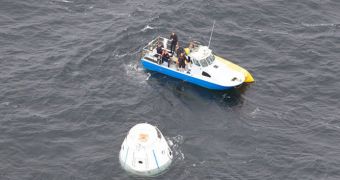According to officials at Space Exploration Technologies (SpaceX), preparations are already underway for modifying the Falcon 9 medium-lift delivery systems for a new spaceflight.
Following the successful launch of the private rocket this June, experts at the company are now targeting an October launch date for a second vehicle.
This time, the rocket will also carry a mock of the Dragon space capsule, which is destined to become a resupply spacecraft for the International Space Station (ISS).
Eventually, the capsule will be upgraded to a manned spacecraft, which will allow for the delivery of American astronauts to low Earth orbit (LEO). That goal is however still a few years away.
At this point, SpaceX is struggling with updating some of its software. The goal is to prevent another glitch such as the one in June, which saw the rocket rotating a little bit after leaving the launch pad.
The company's endeavors into space are being sponsored by a US federal agency that officials at SpaceX refused to name. The firm was funded by Elon Musk, the co-founder of PayPal.
According to the $278 million agreement the company signed with NASA, the next three Falcon 9 missions need to carry Dragon capsules higher and higher into Earth's orbit.
The Commercial Orbital Transportation Services (COTS) initiative is meant to ensure that NASA is supporting the private space industry.
If the Falcon project turns out to be feasible in the long-run, then SpaceX could benefit from a new, $1.6 billion contract with NASA, for regular resupply runs to the ISS.
“We are hopeful that we can berth with station before next summer, but development programs need to allow for the unknown,” says SpaceX spokeswoman Kirstin Brost, quoted by Space.
“The upcoming test flight is much more complicated since it involves not only the Falcon 9 rocket, but also the Dragon spacecraft,” said in an August 11 email Joshua Byerly, aNASA spokesman.
“So you are talking about two brand-new spacecraft,” he added, saying that both SpaceX and NASA are aware that some delays may appear in the current scheduled. But that is to be expected, he added.
“It is too soon to tell whether the commercial resupply flights will be impacted, but we will continue to monitor the progress of our partners,” he went on to say.
At this point, the ISS is resupplied by American space shuttles, and European, Russian and Japanese robotic space capsules.

 14 DAY TRIAL //
14 DAY TRIAL //